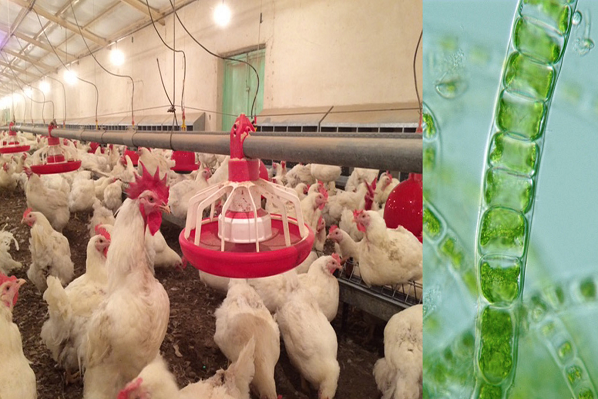Follow us on:
- January 17, 2023
- 2 mins read
Share this post on:
Effects of Spirulina Prebiotic on the Production Performance of Broiler Chickens
To estimate the prebiotic goods of Spirulina as a growth and immunity promoter for broiler chickens, birds were arbitrarily or inversely distributed and fed on a diet containing Spirulina feed respectively for 4 weeks. The study suggests that Spirulina is a good natural feed additive that has a tremendous effect to improve broiler production and thereby may reduce production costs.

- January 17, 2023
- 2 mins read
Share this post on:
Share this post on:
Over 80% of the people of Bangladesh live in rural areas and are highly dependent on an agricultural system that is finely attuned to a tropical monsoon climate. About 49.8% of people live below the poverty line and they receive less than 2100 calories/per person/day per capita availability of animal protein presently stands at around 21 g meat/day, 43 mL milk/day, and 41 eggs/year vis-a-vis the recommended intakes of 2300 calories, 120 g meat/day, 250 mL milk/day and 104 eggs/year.
Total meat production in Bangladesh was 11300 metric tons of which chicken and duck meat contributed 154,000 tons, which ranked second after beef. Per capita meat consumption was only 5.12 kg/ year and per capita, protein intake was 67 gm/day which is markedly below recommended requirements.
Meat production could be increased through poultry rearing and poultry meat is the most popular meat throughout the country. A variety of synthetic feed additives including drugs and antibiotics are used in poultry feeds to maximize the efficiency of production, and product quality and to control diseases. But nowadays poultry industries are currently moving towards a reduction in the use of synthetic antibiotics due to public concerns regarding the development of antibiotic–resistant bacteria in humans.
There is a widespread discouragement of the use of antibiotics in the poultry industry as antimicrobial compounds to control infections and as growth promoters because of bacterial resistance in poultry and the occurrence of residues of antibiotics in meat. This is necessitating the use of prebiotics and probiotics as alternative substances to antibiotics. So, the recent trend in the feed business is currently directed toward the use of natural ingredients as alternatives to antibiotics, synthetic colors, and other chemicals.
Spirulina is rich in thiamin, riboflavin, pyridoxine, vitamin B12, vitamin C and antioxidant carotenoids, and has been used throughout the world as a feed component in broiler and layer diets to enhance yolk, flesh, and color. Spirulina has beneficial effects on arthritis and immuno-stimulatory effects and antiviral activity.
Moreover, Spirulina has been shown to enhance immune function and reproduction, and increase growth. Less than 1% Spirulina added to chicken diets has been found to enhance the defense systems by increasing microbial killing, antigen processing, and greater T-cell activity. In addition, and reported that broilers fed Spirulina-containing diets achieved superior productive performance to their control birds. Spirulina improves absorption of minerals, protects from diarrhea, and optimizes nutrient digestion processes found that carotenoid concentrations increased in the liver, adipose tissue, and breast muscle with increasing algae meal in the diets, and birds had increased yellow pigment in skin compared to the control group.
The broilers on the algae meal diet gained weight faster and significantly (P<0.05) utilized their feed. An early study found no adverse effect of dietary Spirulina on body weight or mortality rate. Recently, found that Spirulina may be helpful for reducing the tissue burden of arsenic in ducks. Also, found that body weights, average daily weight gain, carcass yield percentage, and feed conversion ratio improved by the dietary inclusion of the Spirulina platensis as compared to the control. Spirulina platensis supplementation improved feed conversion and mortality rate.
Considering the cost-effectiveness and prompt growth of broilers, Spirulina would be a natural feed additive to improve broiler production. So, this study was conducted to evaluate the effects of Spirulina as an alternative feed additive to improve its effectiveness in promoting growth in broiler chickens. Spirulina platensis supplementation significantly improves blood parameters.
CONCLUSION
- This study suggests that Spirulina might be used as an alternative and safe nutritional and dietary supplement in broiler production.
- This results has also found that all dietary supplements of Spirulina significantly increased the red blood cell count of chickens in groups fed of Spirulina diet.
Share this post on:
Subscribe To Our Newsletter
Know More about our Products and R&D

